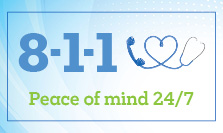Health PEI Psychologists offer holiday coping tips during COVID
As we approach the holiday season, Islanders are reminded that many mental health and addiction services are available year-round to those who need support.
“These are trying times filled with lots of difficult emotions,” said Dr. Jacqueline (Jackie) Roche, clinical psychologist, Health PEI. “Islanders are dealing with grief over the disruption of some holiday traditions, financial uncertainty, and stress associated with frequently having to adapt to big changes. Together we can and will get through this.”
Dr. Roche and fellow clinical psychologist Dr. Jacqueline Goodwin, are sharing some tips for coping during the holiday season.
Take care of your body. Maintain a healthy diet, get some exercise, spend some time outside, and ensure that you are getting adequate rest. Take deep breaths, stretch or meditate daily to support relaxation.
Stick to your routine. Routines are an important part of healthy living. Staying active throughout the day helps to keep our moods steady and can bring us a feeling of satisfaction.
Get good sleep. Keep a regular wake-up time and minimize naps. Avoid caffeine in the evenings and limit screen time in the hour before bed. Sleep is a very important factor in maintaining mental wellness.
Stay connected. Reach out via phone, text, or video chat to friends, neighbours and loved ones. Where restrictions allow, socialize in person. Research shows us that loneliness is linked to many poor health outcomes so find ways to get connected.
Keep up-to-date. Stay tuned to what’s happening with the pandemic by visiting trustworthy sources such as the Government of Prince Edward Island or the World Health Organization (who.int) but be mindful of the time you spend and make sure to take breaks.
Get creative. Plan new ways to keep holiday memories and traditions alive. Do virtual family gatherings, share Christmas sweater photos, bake at home with loved ones, or make a donation to a charity close to your heart.
Embrace it. Try thinking of this year as an opportunity to slow down and enjoy a quieter holiday season. Spend quality time with immediate family members, catch up on those books you’ve been wanting to read, learn a new activity or skill, or set some goals for 2021.
Set clear boundaries. If you feel stressed, overwhelmed or pressured, feel free to place limits on the activities that you and your family take part in. Plan ahead for stressful people, places or things and remember, it’s okay to say no.
Find meaning. Remember that what’s most important about the holidays is not the gifts, but the quality time spent with loved ones. Make a plan for you and your family, to enjoy the company of those who are safe and supportive.
“The holidays are a challenging time for many, and it’s a key time to be mindful of your mental health,” said Dr. Jacqueline Goodwin. “If you’re noticing a number of the following symptoms over the course of a two-week period and they are getting in the way of your life, reach out to a registered health professional for guidance.”
Behaviours/Doing
- trouble sleeping
- avoiding going out even within public guidelines, being active, or talking to people
- too much TV or social media time about COVID-19 or pandemics
- not wanting to get out of bed
- excessive eating, drinking or prescriptions drugs
Thoughts/Thinking
- consumed by thoughts about COVID-19
- frequent thoughts about self or loved ones being in danger
- significant and frequent worry about the future
Emotions/Feeling
- crying more
- feeling anxious, depressed or having panic attacks
- chronic feelings of anger, guilt, helplessness, or confusion
- feeling numb often
- having little patience, feeling frequently irritable
Help is available. You don’t have to do it alone. Islanders can refer themselves or their loved ones to many services available in person, over the phone or online. A full list of all existing supports and services is available at Mental Health Services.
Media contact:
Everton McLean
Senior Communications Officer
Health PEI
902-213-1507
Backgrounder:
Mental Health and Addictions Services are available in communities across the province.
You may refer yourself to some services by calling a community mental health or addictions office in your area (please note that some services may require a referral from a health care provider). When you call, you will be asked to provide your PEI Health Card number.
You may also request a referral to our services from your primary care provider (family doctor, nurse practitioner), other health care professionals or community agency familiar with your concerns.
Resources include:
Mental Health and Addictions Information Line
1-833-533-9333
Calls are answered by trained mental health and addictions staff
Available 8 a.m. – 4 p.m. Monday to Friday
Mental Health Walk-in Clinics also offer immediate support to help with anxiety, depression and other complex and high-risk issues.
Emergencies
For emergencies, please call 9-1-1 or go to your local emergency department.
Telephone resources
The Island Helpline
1-800-218-2885 (toll-free)
Available 24-hours, seven days a week
Kids Help Phone (link is external)
1-800-668-6868 (toll-free)
Available 24 hours, seven days a week
Additional community supports are also available through organizations such as the Canadian Mental Health Association, PEI Family Violence Prevention Services and Family Services PEI.
